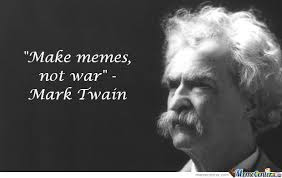Mark Twain, also known as Samuel L. Clemens was born on November 30, 1835, in Florida, Missouri. He is the author of two major classics in American literature known as The Adventures of Tom Sawyer and The Adventures of Huckleberry Finn. Aside from an author, he also had other occupation such as: riverboat pilot, journalist, lecturer, entrepreneur and inventor.
Irony:
Twain exploits three forms of irony. Dramatic irony, which character actions and words reveal something to the audience that the character themselves. Situation Irony, which something else happens from the expectation of something. The last form is Verbal Irony, a way of saying something that that means something else; saying something that has means different from what it implies.
One instance of dramatic irony is when Huck made Jim hide in the canoe with a blanket over him. In this quote, "When we was ready to shove off we was a quarter of a mile below the island, and it was pretty broad day; so I made Jim lay down in the canoe and cover up with a quilt, because if he set up people could tell he was a nigger a good ways." (Twain 58) Although Huck sees blacks and whites as equals, he still holds true that they are different when he says " people could tell he was a nigger a good ways." Being said, this exploits how society thoughts can affect personal ones, even from the ones most innocent of them.
One instance of dramatic irony is when Huck made Jim hide in the canoe with a blanket over him. In this quote, "When we was ready to shove off we was a quarter of a mile below the island, and it was pretty broad day; so I made Jim lay down in the canoe and cover up with a quilt, because if he set up people could tell he was a nigger a good ways." (Twain 58) Although Huck sees blacks and whites as equals, he still holds true that they are different when he says " people could tell he was a nigger a good ways." Being said, this exploits how society thoughts can affect personal ones, even from the ones most innocent of them.
Next, one instance of situation irony is when Huck states that when they get to the free states, that everything will be fine. When Twain states, "We could sell the raft and get on a steamboat and go way up the Ohio amongst the free states, and then be out of trouble." (75) He assumes that when Huck and Jim are "amongst the free states." they be "out of trouble." But in reality, Huck and Jim do not know what is in store for them. This can relate to the innocence in the American Dream regards to the "pursuit of happiness;" as Huck is joyful that there will be positive experiences in their journey.
Finally, an instance of verbal irony is when Huck points out the mistreatment of slaves. When Twain writes, " How is servants treated in England? Do they treat 'em better 'n we treat our niggers? '' No! A servant ain't nobody there. They treat them worse than dogs. " (158) Twain sets Huck as the only person to acknowledge the unfairness of slaves stating that they were worth less than animals because slaves were treated "worse than dogs." This exemplifies Huck unique thinking as an oddity from the typical southern slave owner.
Satire:
Twain expresses satire to mock the essence of humanity during pre-Civil War times. For example when Sherburn was about to be lynched, he begins to talk about the their lack in individuality and that their morals and influence. There Twain mocks the lack of individualism of society stating that they are easily swayed by what is around them.
Another instance is where Twain mocks the idiocy and cruelty of human society. When Twain states, "'See? He'll be drownded, and won't have nobody to blame for it but his own self. I reckon that's a considerable sight better'n killin' of him. I'm unfavorable to killin' a man as long as you can git aroun' it; it ain't good sense, it ain't good morals. Ain't I right?'" (65 - 66) He exploits the idiocy and cruelty of human when he compare someone to "be drownded, and won't have nobody to blame for it but his own self. I reckon that's a considerable sight better'n killin' of him." This new found perspective can be lead to be that humans hate towards each other was not entirely logical due to the idiocy of the populace at the time

No comments:
Post a Comment